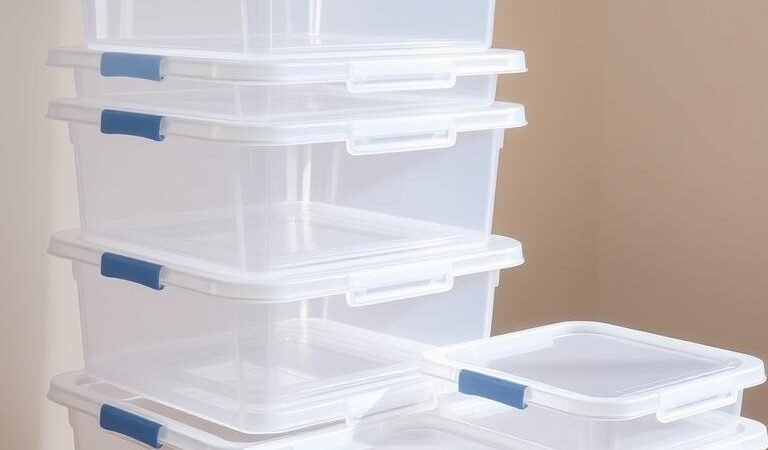Every year, the U.S. discards 900 million cardboard boxes from moves and storage—only a quarter get recycled. This waste fuels a shift toward durable alternatives that cut clutter and environmental impact. Stackable plastic containers, for example, withstand 400+ uses, unlike flimsy single-use boxes.
Imagine a home where labeled, uniform bins create instant order. No more collapsing corners or mystery contents. These systems transform chaotic spaces into streamlined havens—perfect for moves or everyday storage.
Leading rental companies now offer sturdy plastic crates with secure lids. They’re ideal for protecting belongings while reducing landfill waste. It’s a simple switch with lasting benefits for your space and the planet.
Key Takeaways
- Traditional cardboard boxes contribute heavily to waste, with low recycling rates.
- Plastic storage solutions last hundreds of cycles, offering long-term value.
- Color-coded labels and stackable designs simplify home organization.
- Rental services provide eco-friendly moving options without the waste.
- Durable bins protect items better than disposable alternatives.
Why Choose Eco-Friendly Organization Solutions?
The average American home accumulates 300,000 items—many stored in flimsy containers. Traditional cardboard boxes buckle under weight, while their environmentally friendly counterparts offer resilience. Plastic crates, for instance, endure 35% more volume and 200 lbs of pressure, according to Redi-Box.
The Hidden Cost of Disposable Boxes
Cardboard’s short lifespan fuels landfill waste. Unlike boxes made from recycled materials, plastic bins last hundreds of cycles. They resist moisture, protecting photo albums or winter clothes in damp basements.
Smart Design for Effortless Order
Molded handles and uniform sizes save time—no tape or folding required. Crisp label systems turn pantries into visual masterpieces. For more space-saving hacks, explore these affordable home storage ideas.
- Ergonomic grips: Reduce strain during moves.
- Stackable frames: Maximize vertical storage.
- Waterproof seals: Ideal for garages or attics.
Top Eco-Friendly Organization with Reusable Bins and Labels Solutions
Moving day chaos fades when durable solutions enter the picture—national providers now offer smart alternatives to disposable boxes. Eight leading companies and seven regional specialists deliver a wide range of products, from wardrobe crates to dish-safe partitions.
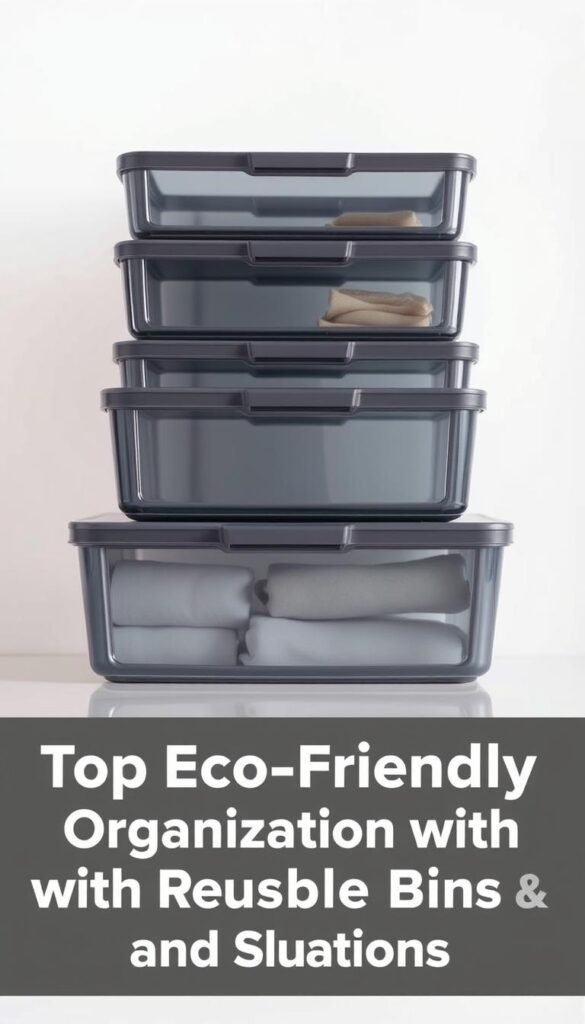
Urban studio moves demand compact, stackable systems. Heavy-duty crates shine for corporate relocations. Bin-It’s sanitized plastic moving boxes cater to hospitals or allergy-prone homes, while color-coded labels turn cluttered spaces into orderly zones.
Key advantages:
- Modular designs: Mix sizes for closets or garages.
- Built-in durability: Crush-proof edges protect fragile items.
- Seamless labels: Peel-and-stick kits sync with bin colors.
For a full comparison of providers, explore top-rated plastic moving box services. These solutions prove that smarter storage starts with the right tools.
1. U-Haul Ready-To-Go Box: Sustainable and Stackable
U-Haul revolutionizes moving with its Ready-To-Go Box system—combining sustainability and convenience. These rugged plastic crates outlast cardboard, with stackable designs that maximize truck or closet space. Imagine stress-free packing: no tape, no collapses, just smooth handles and crisp labels.
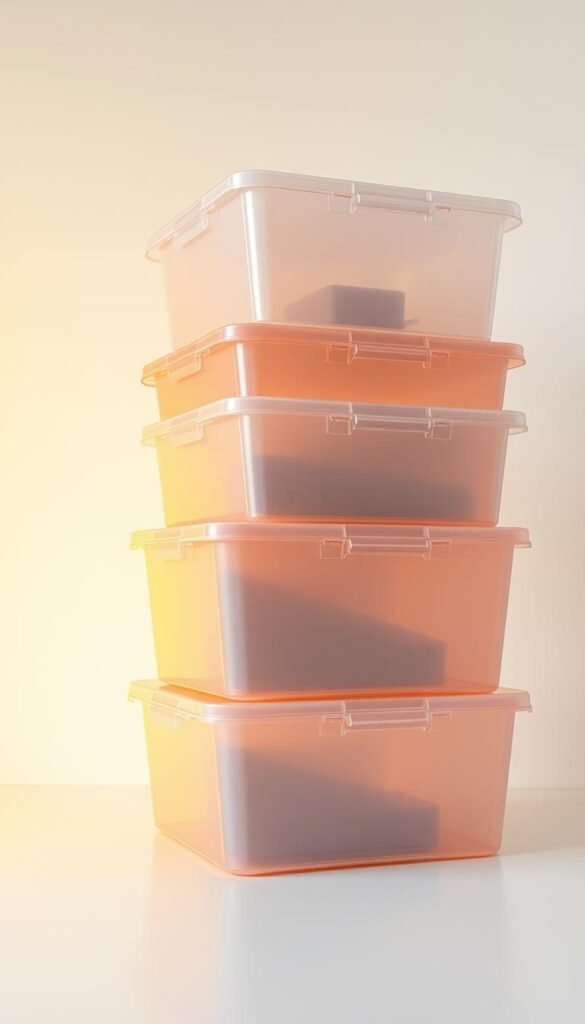
Key Features
U-Haul’s boxes boast crush-proof edges and waterproof seals—ideal for fragile dishes or rainy moves. The uniform sizes nest neatly, while molded grips reduce strain. An online reservation tool lets you customize rental durations, from a weekend to months.
Pricing and Rental Process
At $1.50 per box weekly, U-Haul’s *price* undercuts disposable options. Renting 12 crates costs $18—half the *price* of cardboard. Their 23,000-location *delivery* network ensures same-day pickup. Need help? 24/7 customer support *services* cover last-minute changes.
- Budget-friendly: Save 60% versus single-use boxes.
- Nationwide access: Available in urban and rural areas.
- Hassle-free returns: Drop off at any U-Haul center.
2. Bungo Box: Cost-Effective and Sanitized
Bungo Box stands out in the rental market with its hospital-grade cleaning process—ideal for allergy-sensitive homes. Each crate undergoes UV sanitization, ensuring dust-free storage for delicate items like baby clothes or heirlooms.
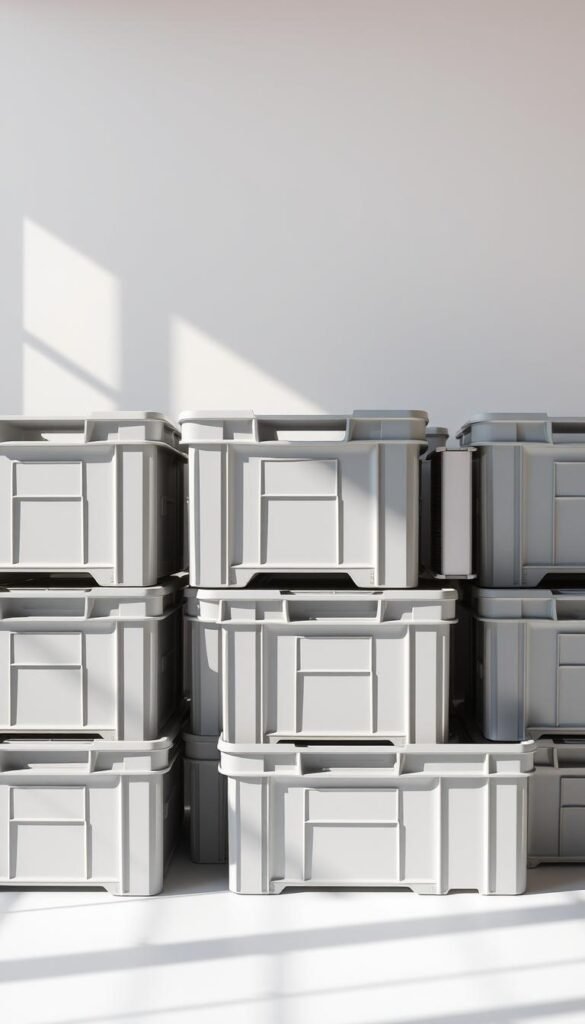
Unique Selling Points
Their online inventory calculator simplifies planning. Input your room dimensions, and the tool suggests the perfect crate mix—no guesswork. Orders include color-coded labels, turning packed boxes into a rainbow of efficiency.
- Free delivery: Threshold kicks in at $75, with 2-hour SMS tracking alerts.
- Depot network: A Seattle family used multiple locations for a cross-country move, saving 30% on logistics.
- Crush-proof design: Reinforced corners protect glassware better than cardboard.
How to Order
Visit their website, select crate sizes, and choose a delivery window. This company streamlines the process with eco-conscious services, from doorstep drop-offs to post-move pickups. Pro tip: Book early during peak seasons for guaranteed availability.
3. Rent A Green Box: Zero-Waste Moving
Southern California movers gain an edge with Rent A Green Box’s zero-emission delivery fleet. Their custom routes slash carbon footprints while transporting three sizes of boxes—each designed for clutter-free packing. It’s moving reimagined: solar-powered warehouses, recycled materials, and a no-waste promise.
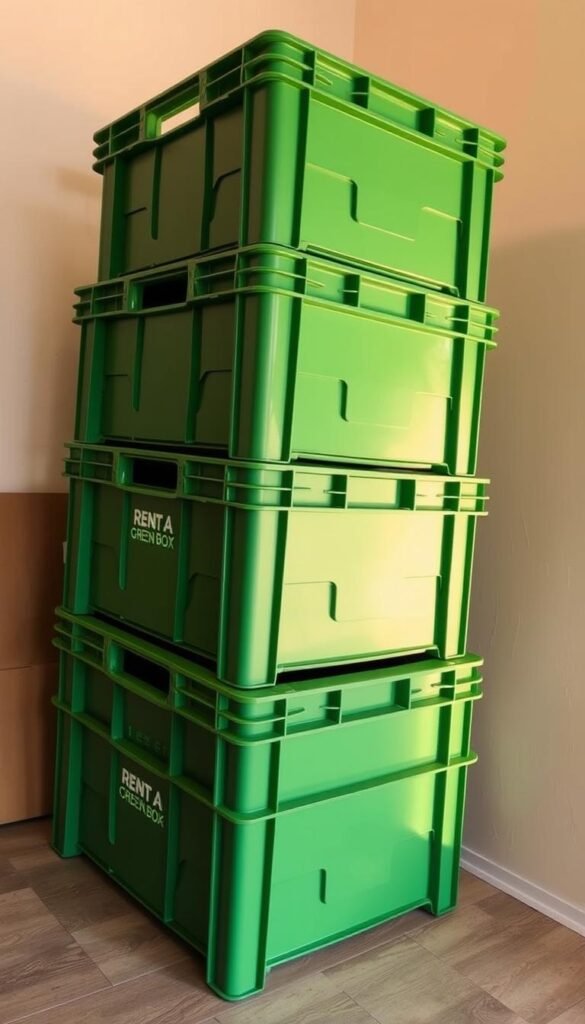
Eco-Credentials
Every crate reflects their green ethos. The XL size features ergonomic handholds—saving backs during heavy lifts. Fragile items? Opt for recycled foam padding, which nestles dishes like cotton batting. Partnering with local solar facilities, they power operations sustainably.
Availability and Sizes
Their range covers studio apartments to five-bedroom homes. Small boxes fit books; medium handles kitchenware; XL conquers bulky decor. Premium products include label kits and partition sets. Same-day drop-offs span Los Angeles to San Diego.
- Emission-free transport: Electric trucks serve 90% of SoCal zip codes.
- Modular accessories: Add dividers or waterproof liners.
- Community roots: Supports urban gardening nonprofits with each rental.
4. Rentacrate: Versatile Options for Businesses
Corporate relocations demand sturdy solutions—Rentacrate delivers with industrial-grade crates built for heavy loads. Their *services* span 13 distribution centers, offering real-time inventory tracking for stress-free planning. Whether moving lab equipment or office files, this *company* tailors crates to commercial needs.
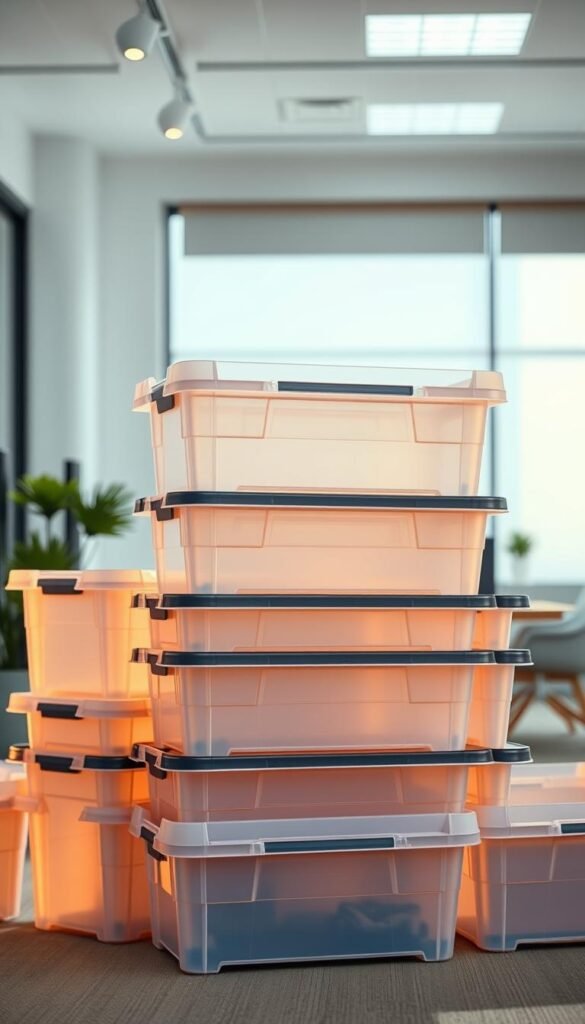
Specialized Crates
Steel-reinforced edges protect sensitive gear during transit. A tech firm’s multi-city relocation showcased their durability—zero damage across 200 crates. The 90-day *rental* option ($250 flat rate) suits long-term projects like renovations.
Nationwide Service
Same-day *delivery* covers urgent moves in major metros. Their carbon offset program neutralizes emissions for cross-country shipments—ideal for eco-conscious corporations.
| Plan | Duration | Price | Best For |
|---|---|---|---|
| Standard | 1–30 days | $1.75/crate daily | Local office shifts |
| Corporate | 90 days | $250 flat rate | Multi-phase relocations |
- Live inventory maps: Reserve crates online with hub-specific availability.
- Climate-controlled options: Safeguard art or pharmaceuticals.
- Modular dividers: Customize interiors for fragile items.
5. Redi-Box: Space-Efficient and Durable
Redi-Box redefines moving efficiency with military-grade crates built to last. Their watertight seals and reinforced corners withstand 250 lbs—ideal for fragile dishes or vintage records. Unlike flimsy alternatives, these crates feature smooth handles for comfortable lifting.
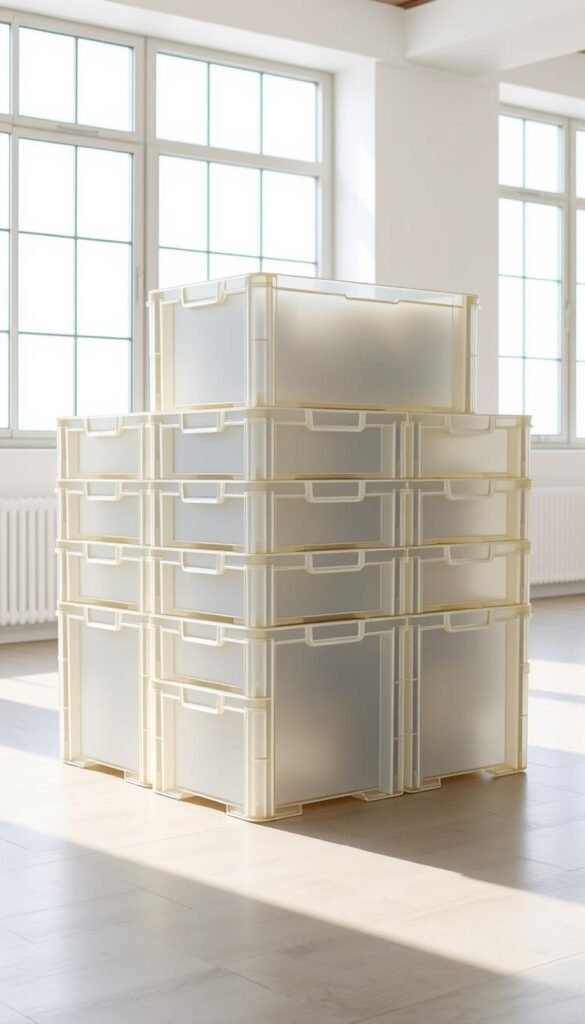
Waterproof and Crushproof Design
Each crate undergoes stress tests to ensure all-weather protection. The interlocking lids create rain-ready armor for garage storage. A family in Portland stored holiday decorations for three years—zero moisture damage reported.
Delivery Policies
Free delivery to Chicago and Portland includes 2-hour SMS alerts. Drivers place crates on designated mats with crisp inventory sheets. The company’s Green Fleet uses electric trucks for 90% of urban drop-offs.
- Doorstep checklist: Confirm crate counts via app before signing.
- Weatherproof covers: Thick tarps shield crates during rainy unloading.
- Weekly rental: $1.25 per crate beats cardboard costs by 40%.
6. Bin-It: Sanitized and Full-Service
Bin-It transforms urban moves with spotless crates and white-glove service—ideal for health-conscious families. Their rental crates undergo UV sterilization between uses, eliminating dust mites and allergens. Each order includes color-coded labels and modular dividers for fragile items.
Included Supplies
The company provides peel-and-stick label sheets matching bin colors—no smudged markers. Dividers nestle wine glasses securely, while foam corner guards protect framed art. A cleaning certificate arrives with every delivery, confirming hospital-grade sanitation.
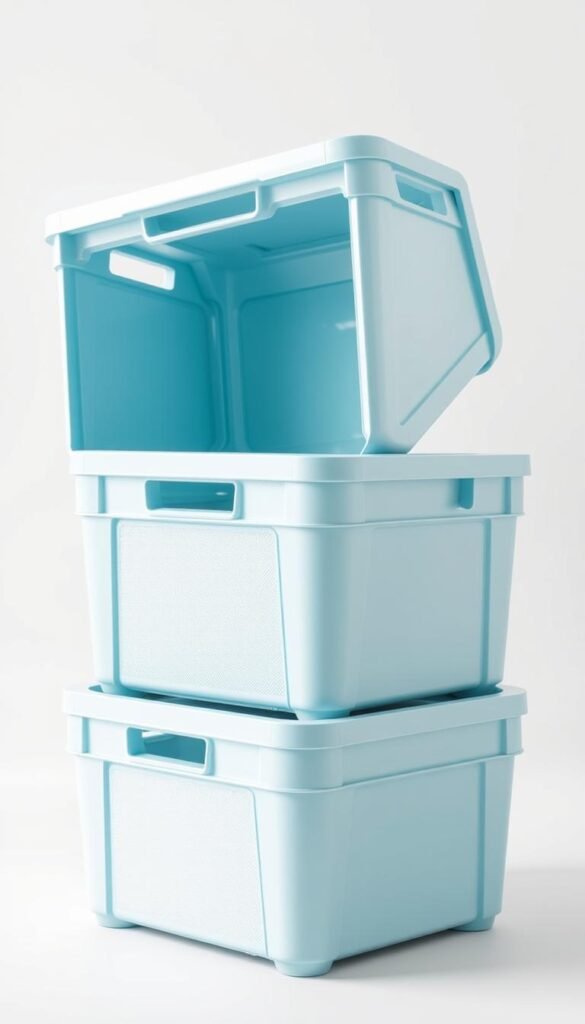
City-Specific Pricing
Urban density impacts costs. New Yorkers pay $109 for 20 crates—almost double Nashville’s $60 package. High-rise elevator fees and parking permits contribute to metro premiums.
| City | 20-Crate Price | Delivery Surcharge |
|---|---|---|
| New York | $109 | $15 (high-rise) |
| Nashville | $60 | Free |
Retired bins get donated to housing nonprofits—over 12,000 repurposed since 2020. Premium markets like Boston enjoy the “Bin Butler” concierge service. Staff unpack crates directly into closets, then haul away empties.
7. Boxbee: Ready-to-Use with Storage Options
Boxbee simplifies California moves with turnkey crate systems—no more hunting for packing supplies. Their *products* arrive pre-labeled, with dollies and dividers included. It’s like having a moving concierge in a box.
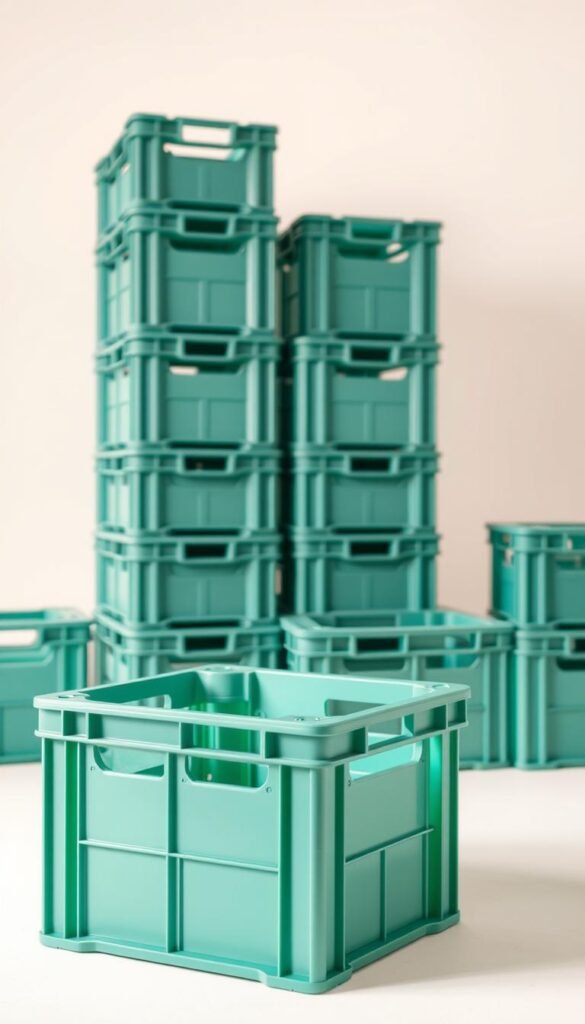
California Focus
Designed for West Coast lifestyles, Boxbee serves urban hubs from San Francisco to San Diego. Their electric *delivery* fleet cuts emissions, while reusable crates eliminate cardboard waste. Perfect for eco-conscious renters.
Package Deals
Choose from three tiers based on home size:
- Studio ($99): 15 crates + 1 dolly for tight spaces.
- Family Home ($299): 50 crates + 3 dollies—ideal for kitchens.
- Mansion ($599): 100 crates + 6 dollies, plus premium labels.
Special programs add flexibility. The “Boxbee Baby” kit helps parents pack nurseries with gentle foam inserts. Influencer collabs offer 15% off with codes like MOVEREADY.
8. Rental Crates: Wide Range of Supplies
Specialized moving solutions go beyond basic crates—offering tailored partitions and climate-controlled options. These upgrades transform standard rentals into precision tools for fragile collections or sensitive equipment.
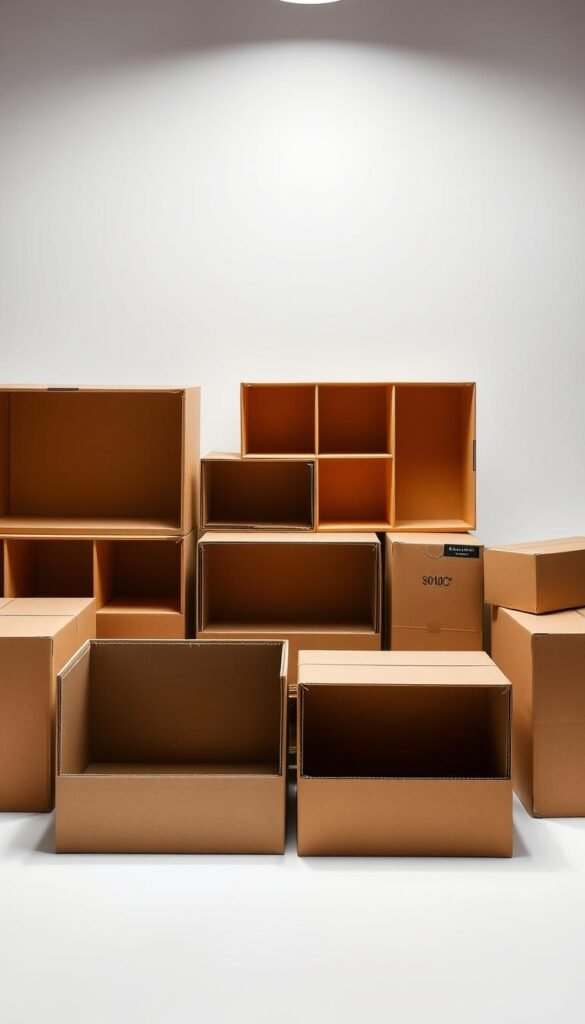
Partitions and Specialty Boxes
Custom dividers protect delicate items like stemware or vinyl records. One company offers archival-grade crates with humidity controls—ideal for transporting antique books. Lab gear? Opt for steel-reinforced edges and shock-absorbent foam.
- White-glove unpacking: Staff unload and place items in designated rooms, then remove empties.
- Military discounts: Active-duty personnel save 15% on rentals in all 50 states.
- Carbon-neutral shipping: Emissions offset via reforestation partnerships.
Shipping Options
Nationwide networks ensure fast delivery, even for last-minute requests. Nonprofits enjoy waived fees—a $50 savings per commercial order. Urban hubs get same-day drop-offs, while rural areas use regional depots.
| Service Tier | Delivery Time | Ideal For |
|---|---|---|
| Standard | 3–5 days | Local moves |
| Express | 24 hours | Urgent relocations |
Climate-controlled trucks safeguard temperature-sensitive cargo. Real-time tracking syncs with your phone—no more guessing about arrival times.
Local Eco-Friendly Moving Box Companies
Regional movers shine with hyper-local solutions tailored to their communities. These providers blend practical storage with hometown flair—offering everything from art-adorned crates to festival-ready rentals.
ZipGo: San Francisco’s Solar-Powered Solution
This Bay Area company delivers sun-drenched crates via electric bikes. Their $40.75/week price for 16 bins includes fog-resistant seals—perfect for coastal moves. Tech workers love the app-controlled locker returns at 25+ BART stations.
Denver’s Moving Boxes: Rocky Mountain Tough
Reinforced crates handle altitude shifts without warping. The “Ski Boot Special” features extra-wide compartments, while their recycled denim insulation keeps fragile items cozy during mountain passes.
Bronko Box: Austin’s Creative Force
Vibrant murals transform their crates into moving art pieces through the “Keep Austin Weird” program. Beyond rental services, they supply stages for music festivals with modular crate systems. Their Barton Springs cleanup initiative repurposes retired bins as floating trash collectors.
- Cultural connection: Local artists design limited-edition crate wraps
- Community impact: 5% of profits fund neighborhood green spaces
- Specialized gear: Waterproof crates for poolside moves
Eco-Friendly vs. Cardboard: A Detailed Comparison
Storage decisions ripple beyond your home—affecting forests, water systems, and carbon footprints. Modern solutions like plastic crates offer durability, while traditional cardboard dominates affordability. But which truly wins when measuring long-term impact?
Breaking Down the Costs
Cardboard’s low upfront price hides recurring expenses. A $2 box lasts one move, while a $15 plastic crate survives 400+ uses. Over a decade, that’s $800 in disposable boxes versus $15 for one durable alternative.
Commercial moves reveal sharper contrasts. A 50-crate office relocation costs $100 with cardboard—but just $75 with rented plastic. Include labor for tape and assembly? Cardboard’s price jumps 30%.
| Factor | Cardboard | Plastic |
|---|---|---|
| Cost per use | $2.00 | $0.04 |
| Labor time | 15 min/box | 2 min/box |
| Damage rate | 12% | 0.5% |
The Ecological Balance Sheet
EcoEnclose research shows one plastic bin saves 343 trees over its lifespan. That’s a forest the size of a football field per 100 crates. Cardboard recycling helps—but 75% still ends up in landfills.
Water savings shock most users. Producing recycled materials for plastic crates uses 91% less water than virgin cardboard—equivalent to 18 Olympic pools per year for a mid-sized moving company.
- Carbon emissions: Plastic creates 2.1 lbs CO2 per crate initially vs cardboard’s 0.3 lbs—but over 400 uses, plastic’s footprint drops to 0.005 lbs per move
- Microplastics: Leading manufacturers now use plant-based polymers that biodegrade safely
- End-of-life: 98% of plastic crates get repurposed versus cardboard’s 25% recycle rate
Every choice casts a shadow. While cardboard feels lighter initially, durable solutions spread their environmental footprint across decades of service.
How to Choose the Right Reusable Bins for Your Needs
GPS-tracked deliveries now streamline 87% of crate rental services, turning chaotic moves into clockwork precision. The ideal system blends container durability with seamless logistics—like a symphony where every instrument plays its part.
Assessing Volume and Duration
Measure your space twice. A 500 sq ft apartment typically needs 25-30 crates, while homes require 50+. Leading company websites offer calculators—input room dimensions for instant estimates.
Consider timeframes. Weekly rental rates suit local moves, but month-long projects need extended plans. Pro tip: Book an extra 10% capacity for last-minute items.
Delivery and Pickup Logistics
Urban moves demand precision. Reserve freight elevators 72 hours ahead—high-rises often charge $50/hour for exclusive use. GPS-enabled delivery trucks provide real-time ETAs, with 2-hour windows becoming standard.
Weather contingencies matter. Midwest relocations should confirm heated storage for electronics during winter. Coastal areas benefit from waterproof seals against humidity.
- Cross-country timeline: Schedule crate arrivals 3 days before loading for inventory checks
- Urban hacks: Night deliveries avoid daytime parking restrictions in metro areas
- Damage protocols: 92% of services provide instant crate replacements via app requests
Maximizing Space with Reusable Labels
Labels transform chaos into order—soy-based inks and bamboo fibers redefine sustainable marking. These tiny powerhouses do more than identify contents; they streamline unpacking and reduce waste. Modern systems blend practicality with *environmentally friendly* innovation, from smudge-proof tags to weather-resistant designs.
Labeling Systems for Efficiency
Color-coding crates by room slashes move-in time. Rentacrate’s erasable labels let you repurpose bins without sticky residue—ideal for seasonal swaps. For outdoor storage, UV-resistant tags endure sun and rain, unlike paper alternatives.
- Bamboo fiber labels: Decompose 3x faster than plastic, with a natural wood texture.
- Stone paper tags: Waterproof and tear-resistant, made from *recycled* minerals.
- Magnetic systems: Snap onto metal shelving for instant updates.
Eco-Conscious Label Materials
Soy-based inks decompose 90% faster than petroleum-based versions. They’re non-toxic and vibrant—perfect for allergy-sensitive homes. Brands like EcoLabel pair these inks with FSC-certified paper, creating *products* that align with green values.
| Material | Lifespan | Best For |
|---|---|---|
| Bamboo fiber | 5+ years | Indoor organization |
| Stone paper | 10+ years | Garages or attics |
Pro tip: Pair labels with clear bins for instant visibility. It’s a game-changer for pantries or toy storage—no more guessing what’s inside.
Tips for Organizing Your Move with Reusable Bins
Smart packing starts with strategy—plastic moving boxes turn moving day into a smooth operation. These durable solutions offer benefits beyond storage, from maximizing truck space to protecting fragile items. Follow these expert techniques to streamline your relocation.
Packing Strategies
Heavy items like books belong in small crates to prevent overloading. Distribute weight evenly—fill gaps with linens or towels to minimize shifting. Label each bin by room and priority level (e.g., “Kitchen – Unpack First”).
- Pyramid stacking: Place largest bins at the base, tapering upward for stability.
- Gripper mats: Non-slip truck liners reduce sliding during transit.
- Vertical space: Stack bins perpendicular to walls to optimize room.
Stacking and Transport
U-Haul’s study shows interlocking bins reduce shifting by 73% versus cardboard. For different vehicles, adjust weight distribution:
| Vehicle Type | Max Bin Weight | Stack Height |
|---|---|---|
| Sedan | 25 lbs/bin | 2 layers |
| Moving Truck | 50 lbs/bin | 5 layers |
Secure stacks with ratchet straps—anchor points near wheel wells prevent tipping. For home storage post-move, rotate bins seasonally to maintain order.
Beyond Moving: Reusable Bins for Home Organization
Durable storage solutions shine beyond moving day—transforming cluttered spaces into streamlined sanctuaries. These versatile containers transition seamlessly from transport duty to permanent home organization, offering year-round value that disposable boxes can’t match.
Closet and Garage Solutions
Different spaces demand specialized approaches. Closets benefit from clear-sided bins that reveal contents while blocking dust—a perfect alternative to cardboard that yellow photographs and attracts silverfish. Garages require heavy-duty options with airtight seals that maintain 35% humidity, ideal for preserving leather goods or vintage fabrics.
Material performance varies significantly:
- Polypropylene resists insects and won’t warp in temperature swings
- Recycled PET offers museum-grade textile preservation with UV protection
- Plant-based polymers provide environmentally friendly options without sacrificing durability
Long-Term Storage Benefits
Proper storage extends far beyond basic protection. Fire-retardant bins safeguard important documents, while acid-free liners prevent yellowing of delicate items. The same crates that survived your cross-country move can become archival-quality storage for:
| Collection Type | Ideal Bin Features |
|---|---|
| Family photos | Archival-grade plastic with pH-neutral lining |
| Seasonal decor | Stackable design with clear viewing panels |
For heirloom textiles, museum curators recommend alternating layers of unbleached cotton between folded items. This technique prevents crease damage while allowing the fabric to breathe—perfect for christening gowns or vintage quilts.
Conclusion: Embrace a Greener, More Organized Future
A clutter-free home begins with mindful choices—ones that blend practicality and planet-conscious thinking. Glass jars gleam beside neatly stacked containers, their labels crisp under warm light. This harmony isn’t just visual; it’s a tactile experience that reduces stress and wasted time.
Every durable bin chosen over disposable boxes creates ripples. Fewer trees felled, less landfill waste—a lighter environmental impact with each move. Leafy Moving’s survey confirms it: 72% of adopters report deeper life satisfaction after decluttering.
Start small. Label one bin today. Feel the calm of knowing exactly where holiday decorations or spare linens live. That’s the power of intentional space—where outer order nurtures inner peace.
